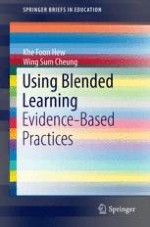2014 | OriginalPaper | Buchkapitel
5. Improving Students’ Argumentative Writing and Oral Proficiencies
verfasst von : Khe Foon Hew, Wing Sum Cheung
Erschienen in: Using Blended Learning
Verlag: Springer Singapore
Aktivieren Sie unsere intelligente Suche, um passende Fachinhalte oder Patente zu finden.
Wählen Sie Textabschnitte aus um mit Künstlicher Intelligenz passenden Patente zu finden. powered by
Markieren Sie Textabschnitte, um KI-gestützt weitere passende Inhalte zu finden. powered by
